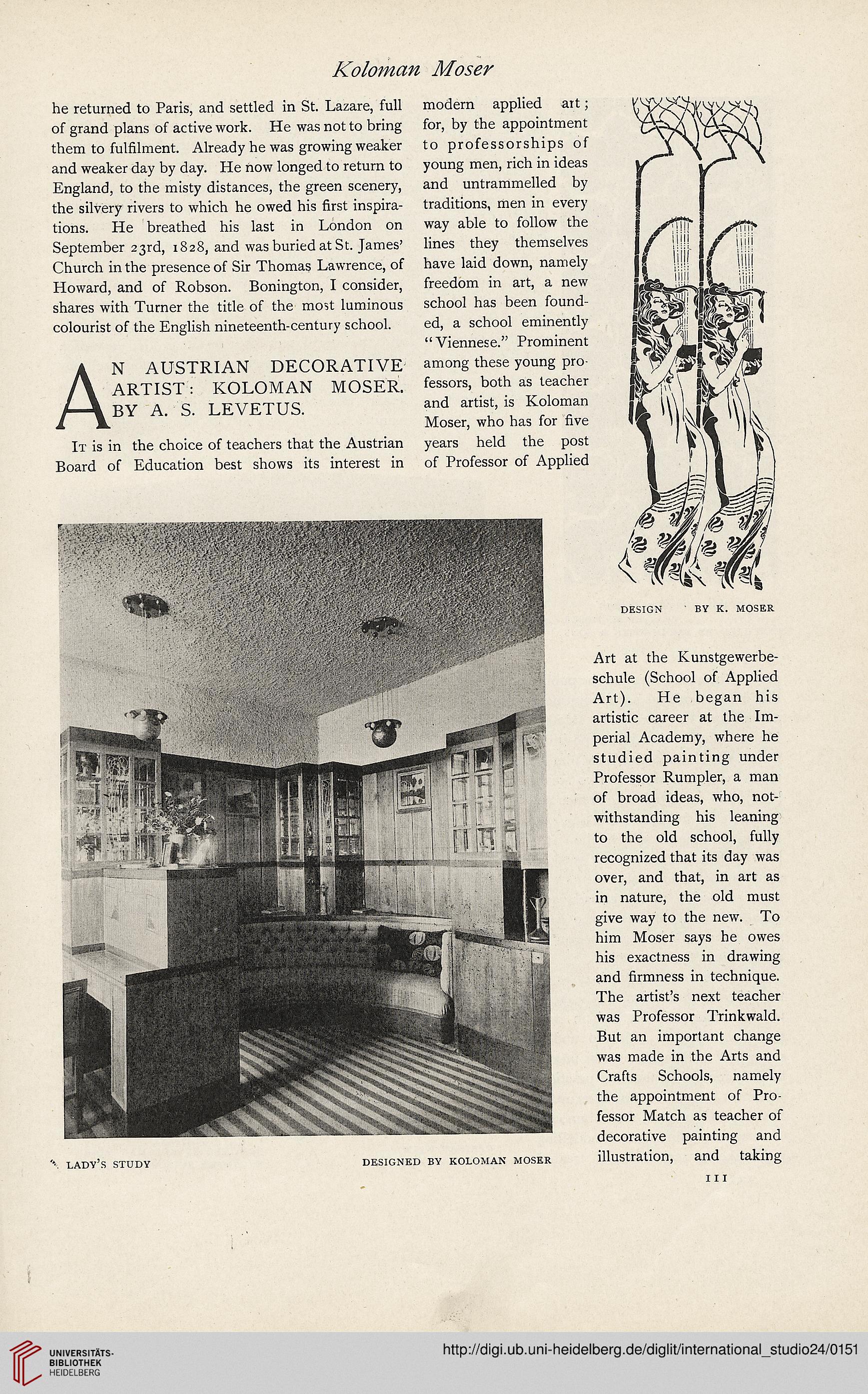Koloman Moser
he returned to Paris, and settled in St. Lazare, full
of grand plans of active work. He was not to bring
them to fulfilment. Already he was growing weaker
and weaker day by day. He now longed to return to
England, to the misty distances, the green scenery,
the silvery rivers to which he owed his first inspira-
tions. He breathed his last in London on
September 23rd, 1828, and was buried at St. James’
Church in the presence of Sir Thomas Lawrence, of
Howard, and of Robson. Bonington, I consider,
shares with Turner the title of the most luminous
colourist of the English nineteenth-century school.
It is in
Board of
N AUSTRIAN DECORATIVE
ARTIST: KOLOMAN MOSER.
BY A. S. LEVETUS.
the choice of teachers that the Austrian
Education best shows its interest in
modern applied ait;
for, by the appointment
to professorships of
young men, rich in ideas
and untrammelled by
traditions, men in every
way able to follow the
lines they themselves
have laid down, namely
freedom in art, a new
school has been found-
ed, a school eminently
“Viennese.” Prominent
among these young pro-
fessors, both as teacher
and artist, is Koloman
Moser, who has for five
years held the post
of Professor of Applied
lady’s study
DESIGNED BY KOLOMAN MOSER
Art at the Kunstgewerbe-
schule (School of Applied
Art). He began his
artistic career at the Im-
perial Academy, where he
studied painting under
Professor Rumpler, a man
of broad ideas, who, not-
withstanding his leaning
to the old school, fully
recognized that its day was
over, and that, in art as
in nature, the old must
give way to the new. To
him Moser says he owes
his exactness in drawing
and firmness in technique.
The artist’s next teacher
was Professor Trinkwald.
But an important change
was made in the Arts and
Crafts Schools, namely
the appointment of Pro-
fessor Match as teacher of
decorative painting and
illustration, and taking
hi
he returned to Paris, and settled in St. Lazare, full
of grand plans of active work. He was not to bring
them to fulfilment. Already he was growing weaker
and weaker day by day. He now longed to return to
England, to the misty distances, the green scenery,
the silvery rivers to which he owed his first inspira-
tions. He breathed his last in London on
September 23rd, 1828, and was buried at St. James’
Church in the presence of Sir Thomas Lawrence, of
Howard, and of Robson. Bonington, I consider,
shares with Turner the title of the most luminous
colourist of the English nineteenth-century school.
It is in
Board of
N AUSTRIAN DECORATIVE
ARTIST: KOLOMAN MOSER.
BY A. S. LEVETUS.
the choice of teachers that the Austrian
Education best shows its interest in
modern applied ait;
for, by the appointment
to professorships of
young men, rich in ideas
and untrammelled by
traditions, men in every
way able to follow the
lines they themselves
have laid down, namely
freedom in art, a new
school has been found-
ed, a school eminently
“Viennese.” Prominent
among these young pro-
fessors, both as teacher
and artist, is Koloman
Moser, who has for five
years held the post
of Professor of Applied
lady’s study
DESIGNED BY KOLOMAN MOSER
Art at the Kunstgewerbe-
schule (School of Applied
Art). He began his
artistic career at the Im-
perial Academy, where he
studied painting under
Professor Rumpler, a man
of broad ideas, who, not-
withstanding his leaning
to the old school, fully
recognized that its day was
over, and that, in art as
in nature, the old must
give way to the new. To
him Moser says he owes
his exactness in drawing
and firmness in technique.
The artist’s next teacher
was Professor Trinkwald.
But an important change
was made in the Arts and
Crafts Schools, namely
the appointment of Pro-
fessor Match as teacher of
decorative painting and
illustration, and taking
hi




